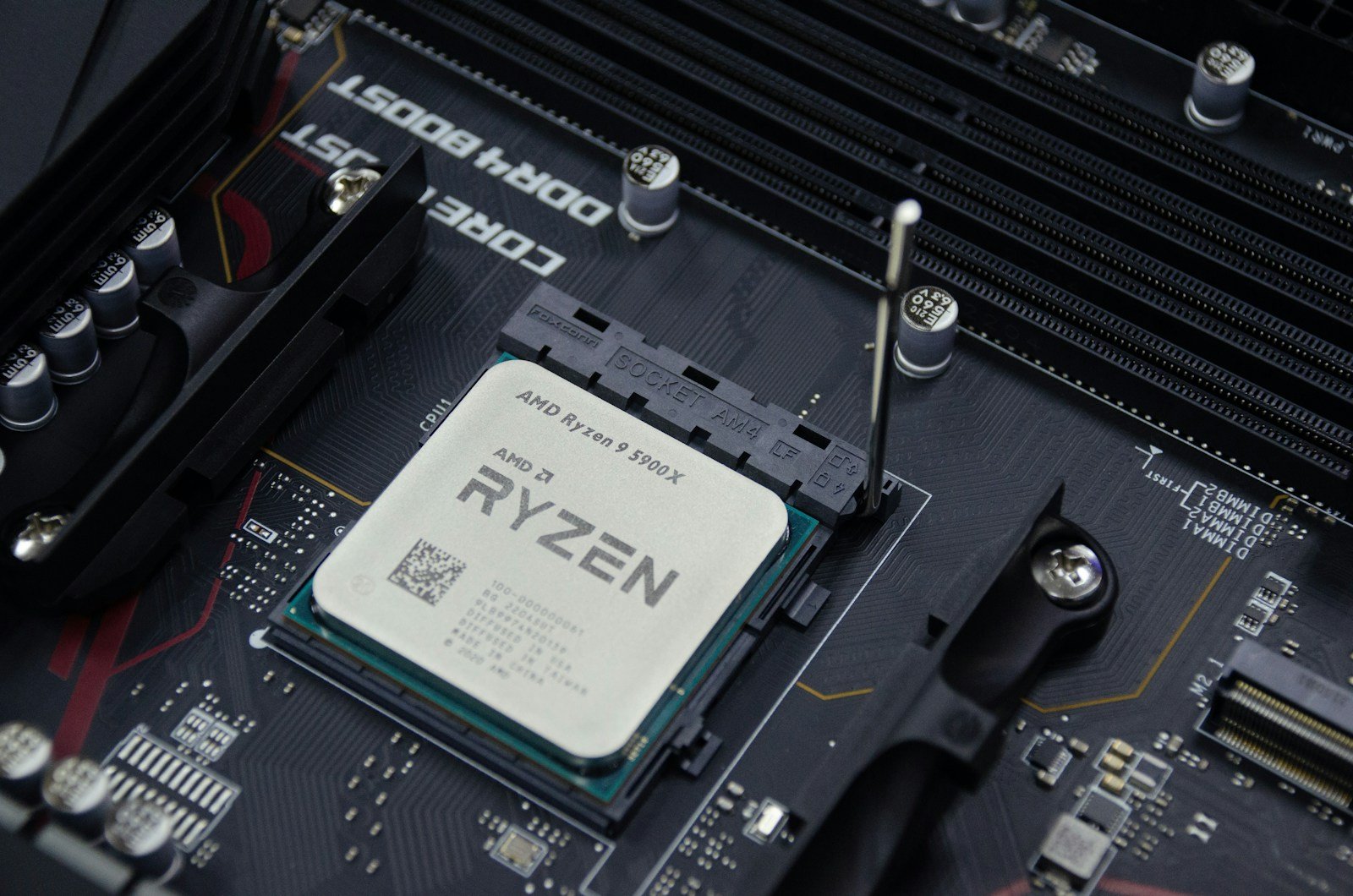Choosing the right processor is a key step when building a computer for gaming, work, or everyday tasks. AMD offers many options that can fit different needs and budgets. The AMD Ryzen 9 9800X3D stands out as the fastest gaming chip on the market right now, beating even Intel’s more expensive options.
AMD processors have become very popular due to their strong performance and good value. The Ryzen series comes in different models, from the basic Ryzen 5 to the powerful Ryzen 9 and Threadripper versions. These chips work well for both casual users and serious gamers who need top speed.
AMD has been steadily pushing the boundaries of CPU performance with its Ryzen, Threadripper, and EPYC series. As we enter 2026, AMD’s Zen 5 and upcoming Zen 6 architectures dominate the desktop and mobile markets, offering exceptional performance, efficiency, and value across all budgets.
Ranking The AMD Processors
| Rank | Model | Cores | Clock | Boost | Generation | TDP |
|---|---|---|---|---|---|---|
| 1 | AMD Ryzen 7 9800X3D | 8 | 4.7 GHz | 5.2 GHz | Zen 5 | 120 W |
| 2 | AMD Ryzen 7 7800X3D | 8 | 4.2 GHz | 5 GHz | Zen 4 | 120 W |
| 3 | AMD Ryzen 5 7600X | 6 | 4.7 GHz | 5.3 GHz | Zen 4 | 105 W |
| 4 | AMD Ryzen 5 9600X | 6 | 3.9 GHz | 5.4 GHz | Zen 5 | 65 W |
| 5 | AMD Ryzen 9 9950X3D | 16 | 4.3 GHz | 5.7 GHz | Zen 5 | 170 W |
| 6 | AMD Ryzen 7 7700X | 8 | 4.5 GHz | 5.4 GHz | Zen 4 | 105 W |
| 7 | AMD Ryzen 7 9700X | 8 | 3.8 GHz | 5.5 GHz | Zen 5 | 65 W |
| 8 | AMD Ryzen 5 5600 | 6 | 3.5 GHz | 4.4 GHz | Zen 3 | 65 W |
| 9 | AMD Ryzen 5 5600X | 6 | 3.7 GHz | 4.6 GHz | Zen 3 | 65 W |
| 10 | AMD Ryzen 7 5800X | 8 | 3.8 GHz | 4.7 GHz | Zen 3 | 105 W |
🔺 1. Best Overall Performance: AMD Ryzen 9 9950X (Zen 5)
Key Specs (expected/confirmed):
- Architecture: Zen 5
- Cores / Threads: 16 / 32
- Base / Boost Clock: ~4.3 / 5.7 GHz
- TDP: 170W
- Socket: AM5
- Process Node: 4nm (TSMC N4)
Why It’s Great:
The Ryzen 9 9950X is the flagship of the Ryzen 9000 series, delivering top-tier performance for gaming, content creation, and workstation tasks. It outperforms Intel’s 14th-gen and early 15th-gen Core i9 chips in multi-threaded workloads while maintaining excellent power efficiency.
Best For:
- Enthusiast gamers
- Video editors, 3D artists, and developers
- Users who want the fastest consumer desktop CPU
Approx. Price (2026): $599–$649
💰 2. Best Value for Money: AMD Ryzen 7 9700X
Key Specs:
- Architecture: Zen 5
- Cores / Threads: 8 / 16
- Base / Boost Clock: ~3.8 / 5.5 GHz
- TDP: 65W
- Socket: AM5
Why It’s Great:
The Ryzen 7 9700X hits the sweet spot between price and performance. It’s ideal for gamers and creators who want high-end performance without paying flagship prices. It pairs well with midrange GPUs like the Radeon RX 7900 GRE or RTX 4070 Ti Super.
Best For:
- Gamers who want top-tier performance at a reasonable price
- Streamers and light content creators
Approx. Price (2026): $349–$399
🧩 3. Best Budget Pick: AMD Ryzen 5 9600X
Key Specs:
- Architecture: Zen 5
- Cores / Threads: 6 / 12
- Base / Boost Clock: ~3.9 / 5.3 GHz
- TDP: 65W
- Socket: AM5
Why It’s Great:
The Ryzen 5 9600X continues AMD’s tradition of delivering strong midrange CPUs that punch above their price. It’s perfect for gamers on a budget who still want great performance in 1080p and 1440p titles.
Best For:
- Budget gaming builds
- General productivity and light creative work
Approx. Price (2026): $249–$279
⚙️ 4. Best for Workstations: AMD Ryzen Threadripper 7995WX
Key Specs:
- Architecture: Zen 4 (Pro)
- Cores / Threads: 96 / 192
- TDP: 350W
- Socket: sTR5
Why It’s Great:
For professionals handling 3D rendering, simulation, or large-scale video production, the Threadripper 7995WX remains a powerhouse. Even as Zen 5-based Threadrippers are expected in late 2026, this model still offers unmatched multi-core performance.
Best For:
- Engineers, animators, and scientific computing
- Heavy multitasking and virtualization
Approx. Price (2026): $4,999
🧳 5. Best Laptop Processor: AMD Ryzen 9 9955HX (Zen 5 Mobile)
Key Specs:
- Cores / Threads: 16 / 32
- Graphics: Integrated RDNA 3.5 GPU
- TDP: 55W+
- Process Node: 4nm
Why It’s Great:
The Ryzen 9 9955HX powers high-end gaming and creator laptops. It combines desktop-class performance with excellent efficiency and integrated graphics that rival entry-level discrete GPUs.
Best For:
- Gaming laptops
- Mobile workstations
- Power users on the go
Approx. Price (Laptop Systems): $2,000+
🧩 Honorable Mention: AMD Ryzen 7 8700G (APU with RDNA 3 Graphics)
Why It’s Great:
For users who don’t need a discrete GPU, the Ryzen 7 8700G offers impressive integrated graphics and solid CPU performance. It’s perfect for small form-factor PCs or budget gaming setups.
Approx. Price (2026): $299
⚖️ Summary Table
| Segment | Processor | Cores / Threads | Architecture | Best For | Approx. Price |
|---|---|---|---|---|---|
| Flagship | Ryzen 9 9950X | 16 / 32 | Zen 5 | Ultimate performance | $599 |
| Best Value | Ryzen 7 9700X | 8 / 16 | Zen 5 | Gaming & productivity | $379 |
| Budget | Ryzen 5 9600X | 6 / 12 | Zen 5 | Affordable gaming | $259 |
| Workstation | Threadripper 7995WX | 96 / 192 | Zen 4 | Professional workloads | $4,999 |
| Laptop | Ryzen 9 9955HX | 16 / 32 | Zen 5 | Mobile performance | $2,000+ |
| APU | Ryzen 7 8700G | 8 / 16 | Zen 4 | GPU-less builds | $299 |
⚙️ Buying Tips for 2026
- AM5 Longevity: AMD has committed to supporting AM5 through at least 2027, so buying into this platform now ensures future upgrade paths.
- DDR5 Memory: All current Ryzen 9000 CPUs support DDR5 only — aim for DDR5-6000 CL30 for the best performance.
- Cooling: Zen 5 chips run cooler than Zen 4, but high-end models still benefit from quality air or liquid cooling.
- PCIe 5.0: Take advantage of faster SSDs and GPUs with PCIe 5.0 support.
- Integrated Graphics: Even non-G-series CPUs now include basic RDNA graphics, useful for troubleshooting or basic display output.
🏁 Final Thoughts
In 2026, AMD continues to dominate the CPU landscape with a strong lineup that caters to every type of user — from budget gamers to professional creators. The Ryzen 9 9950X leads the pack for raw power, while the Ryzen 7 9700X delivers unbeatable value for most users.
If you’re building or upgrading a PC this year, AMD’s Zen 5 lineup offers the perfect balance of performance, efficiency, and future-proofing.
1. AMD Ryzen 7 9800X3D
The AMD Ryzen 7 9800X3D stands as the best gaming CPU in AMD’s lineup. Built on the Zen 5 architecture, this processor has quickly gained a reputation for its exceptional gaming performance.
What makes this CPU special is the 2nd generation AMD 3D V-Cache technology. This tech cuts down latency and boosts gaming speed, giving players a real edge in their games.
The 9800X3D shows about an 11.4% performance gain over the previous 7800X3D model when tested at 1080p. This jump makes it a top pick for serious gamers.
One big plus is that the 9800X3D is unlocked for overclocking. This feature lets users push the chip beyond its stock settings to get even more power out of it.
The CPU doesn’t have high cooling needs either. This makes it easier to fit into many PC builds without needing fancy cooling systems.
For most gamers using higher resolutions, the benefits might be less obvious. At 1080p, the gains are clear, but at higher resolutions, the difference may not justify an upgrade unless paired with a new graphics card too.
Power use has gone up compared to older models. The 9800X3D uses about 45% more power than the 7800X3D on average.
AMD clearly made gaming the focus with this chip. The company’s official product page highlights its position as a gaming-first CPU with the “ultimate gaming edge.”
Supply issues plagued this processor after launch, but now it’s more readily available at its suggested retail price. This makes it a more practical option for PC builders.
For pure gaming builds, few options can match what the 9800X3D offers. It sets a new bar for what gamers can expect from their processors.
Understanding AMD Architecture
AMD processors are built on innovative designs that deliver powerful performance for different computing needs. The architecture focuses on efficiency, core counts, and advanced technologies to compete in the market.
Key Features of AMD Processors
AMD’s modern processors use the Zen core architecture, which forms the backbone of their performance capabilities. This design allows for better multi-tasking and energy efficiency compared to older models.
One major feature is the platform distinction between AM4 and AM5 sockets, with AM5 being the newer option. AM4 CPUs have pins on the processor itself, while AM5 shifts pins to the motherboard.
AMD organizes its processors into clear segments:
- Ryzen 3: Basic models for everyday tasks
- Ryzen 5: Balanced processors for casual gaming and light creative work
- Ryzen 7/9: High-performance options for demanding tasks
The multi-chip module design lets AMD pack more cores into their processors while maintaining reasonable prices and thermal performance.
Comparison With Other Architectures
AMD’s approach differs from competitors mainly in how cores are handled. While other manufacturers focus on fewer, stronger cores, AMD often provides more cores at similar price points, giving an edge in multi-threaded applications.
The Zen architecture has helped AMD close the performance gap that existed for years. Current AMD processors offer comparable or better performance in many workloads while typically using less power.
Key advantages of AMD over competitors include:
- More cores per dollar
- Better integrated graphics in many models
- PCIe 4.0/5.0 support earlier than competitors
- Generally better multi-threaded performance
Heat management has improved dramatically in newer generations, addressing what was once a weakness compared to other architectures.
Performance Metrics to Consider
When choosing the best AMD processor, understanding key performance metrics helps you make an informed decision that matches your specific needs. These metrics determine how well your CPU will handle various tasks.
Single-Core vs Multi-Core Performance
Single-core performance matters most for programs that don’t use multiple cores, like many games and basic applications. AMD’s newer Ryzen processors have greatly improved in this area, making them competitive with Intel options.
Multi-core performance becomes important for tasks like video editing, 3D rendering, and streaming. The AMD Ryzen 9 7950X leads the pack with excellent multi-core capabilities due to its high core count.
When comparing processors, look at both metrics:
- Single-core: Better for gaming and everyday tasks
- Multi-threaded: Better for content creation and multitasking
Benchmark tests provide objective measurements of CPU performance across different scenarios. These tests help users compare processors fairly.
Energy Efficiency and Thermal Design
Energy efficiency affects both power consumption and heat output. AMD’s newer processors often use less power than older models while delivering better performance per watt.
Thermal Design Power (TDP) indicates how much heat a processor generates at maximum load. Lower TDP means:
- Less cooling required
- Lower electricity bills
- Quieter systems
AMD uses advanced power management features in their processors to balance performance and energy use. Their 7nm and 5nm manufacturing processes help create more efficient CPUs.
When building a PC, match your cooling solution to your processor’s TDP. High-performance AMD chips like the Ryzen 9 series benefit from quality cooling to maintain top speeds during intense workloads.
Frequently Asked Questions
AMD processors offer many options for different needs and budgets. Here are answers to common questions about choosing the right AMD CPU for your specific situation.
What considerations should be made when selecting an AMD processor for gaming purposes?
When choosing an AMD processor for gaming, focus on core count, clock speed, and cache size. Games benefit from faster single-core performance rather than many cores.
The sweet spot for gaming is usually 6-8 cores. More important than core count is the processor’s boost clock speed, which directly impacts frame rates in most games.
Budget is also key. The Ryzen 7000 series offers excellent gaming performance, with all models including integrated graphics if you need a temporary solution before adding a dedicated GPU.
How does the Ryzen 7 compare to the Ryzen 9 in terms of performance?
Ryzen 7 processors typically have 8 cores, while Ryzen 9 models offer 12-16 cores. For most games, the performance difference is small since few games use more than 8 cores effectively.
The Ryzen 9 pulls ahead in tasks like video editing, 3D rendering, and streaming while gaming. It’s about 10-15% faster in multi-threaded workloads compared to Ryzen 7.
Price is another factor. Ryzen 7 models like the 9800X3D offer excellent gaming performance at a lower cost than Ryzen 9 processors, making them better value for pure gaming setups.
Which AMD processor offers the best value for laptops?
The Ryzen 5 and Ryzen 7 mobile processors hit the sweet spot for laptop value. They balance performance, battery life, and cost effectively.
Ryzen 7 mobile chips provide enough power for gaming and content creation while maintaining reasonable battery life. They typically include good integrated graphics for casual gaming.
For students and office workers, the Ryzen 5 mobile series delivers excellent performance for everyday tasks at a lower price point, with surprisingly capable multi-tasking abilities.
How does the AMD Ryzen 9 series stack up against the Intel i9 series?
The AMD Ryzen 9 processors often offer more cores than comparable Intel i9 models at similar price points. This gives AMD an edge in heavily multi-threaded workloads.
Intel i9 chips sometimes maintain a slight advantage in single-core performance, which can benefit certain games and applications. However, recent AMD processors have closed this gap significantly.
Power efficiency typically favors AMD, with Ryzen 9 processors often consuming less power while delivering similar performance to Intel i9 counterparts.
What are the advantages of the latest AMD Ryzen 9 7950X processor for high-end PCs?
The Ryzen 9 7950X provides 16 cores and 32 threads, making it exceptional for demanding workloads like 3D rendering and video production. Its high core count handles multiple heavy tasks simultaneously.
It uses the new AM5 socket with PCIe 5.0 support, providing future upgrade paths and compatibility with the fastest storage and expansion cards available.
The processor includes integrated graphics capabilities, allowing systems to function without a dedicated GPU when needed, which is helpful during graphics card shortages or for troubleshooting.
What are the top AMD processors currently recommended for gaming?
The Ryzen 7 9800X3D stands as the current gaming champion among AMD processors. Its 3D V-Cache technology provides extra cache memory that significantly boosts gaming performance.
For mid-range gaming, the Ryzen 5 7600X offers excellent value. It has strong single-core performance that handles most modern games with ease.
The Ryzen 7000 series tops many gaming benchmark charts. Even the more affordable models provide smooth gameplay at high frame rates for most popular titles.







